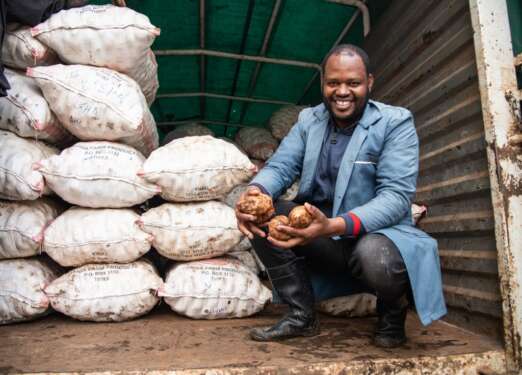Since covid-19 was first reportd in Kenya in March last year, a series of challenges have affected several sectors. Agriculture sector has not been spared either.
In Kenya agriculture is the engine of economic growth in Kenya. According to data from Food and Agriculture organization (FAO), about 75 per cent of Kenyans earn all or part of their income from this sector.
Agriculture accounts for 33 per cent of the nation’s gross domestic product (GDP). Despite continuous population growth, agricultural productivity has stagnated in recent years. Only 20 per cent of Kenyan land is suitable for farming and that land is not utilized efficiently.
To this end, the United States International University-Africa (USIU-A), through support provided by the International Development Research Centre (IDRC) and Australian Centre for International Agricultural Research through their Cultivate Africa’s Future initiative, has been providing young agripreneurs, aged 18-35 years, with access to business training, finance and mentor support. The program, implemented by the USIU-A’s Global Agribusiness Management and Entrepreneurship (GAME) Center, aims to enable Kenyan youths to develop and maintain resilient, job-creating enterprises.
At a virtual roundtable event recently concluded, the results of a recent USIU-A study funded by IDRC to determine the impacts of the pandemic and its gender implications on young entrepreneurs were presented.
According to the Kenya Agribusiness Strategy (2017-2021), youth (18-34 years) account for 29 per cent of Kenya’s population and are significant to Kenya’s growth and transformation agenda. However, 70-80 per cent of entrepreneurs fail within their first two years of business. With the disruption of agricultural value chains since the onset of the pandemic, USIU-A received additional funding from IDRC to better understand the factors that allow young people to be more resilient and to keep their agribusinesses afloat.
“This rapid response initiative to document changes in real-time, is part of our efforts at IDRC to help inform recovery of policies and reorganizing of food systems during the current crisis but also to help us prepare for future shocks,” explained Kathryn Toure, IDRC Regional Director, Eastern and Southern Africa to roundtable participants.
Consequences of covid-19 crisis
Analysis of the results revealed that by November 2020, 366 (73 per cent) were still in business but by January 2021, this had dropped to 260 (52 per cent) with a 48 per cent failure rate. Of those 264 men and 102 women still active in November, most had high school education and were predominantly self-employed in agribusiness. Strikingly, although perhaps understandably, over 90 per centwere unprepared for the COVID-19 crisis. “I never thought anything like this could happen in my lifetime,” stated Kelly Kadiviria, an agriprenuer from Kakamega County.
During the study, the average entrepreneur laid off two workers and reduced the money spent on wages. “I could no longer afford to keep them (employees)… I just had to let them go,” explained Jared Omondi Andego from Kisumu County. Significant numbers of respondents had to fall back on savings or seek additional support from family or business associations. The impacts of the pandemic seemed to hit female entrepreneurs particularly hard with a much higher chance of failure resulting from reduced customer bases and falling sales. “Our sales decreased sharply…I used to make an average of Ksh. 6,000 ($60) a week, now I can hardly make Ksh. 3,000 ($30),” added Benedetta Nangila, a fodder farmer from Bungoma County.
Also Read: Boosting Agriculture Through Technology
Building better futures
Nevertheless, more resilient entrepreneurs were shown to have spent more time networking, seeking advice and additional funds, and using social media to increase sales. Diversification was also key to sustaining agribusinesses. The USIU-A training has also provided many of the entrepreneurs with essential skills. “Because of the pandemic, the income is less and varies but I was able to check on my costs. I was not doing that before the training,” Samuel Thuo Irungu, a potato entrepreneur from Nairobi County explained during the roundtable.
To provide more immediate support, Professor Amos Njuguna emphasised the need for County Governments to provide stimulus packages to agribusinesses impacted by COVID, including business licenses, seeds and other critical inputs, and agricultural services. More broadly, he also emphasised that agribusinesses needed to be exposed to more diversified markets and marketing channels through county, national, continental and international trading blocs. Government agencies and other organizations working with youth also need to support research, networking, technology and knowledge transfer and capacity building for entrepreneurs.
Forging ahead, the GAME Center will support County Governments to implement county specific agribusiness strategies, upscale the training and work with private sector players to accelerate implementation of digital platforms that connect the youth to agricultural value chains.
In total, 874 young men and women active agripreneurs from 31 Counties consented in July 2020 to be involved in the study. With COVID-19 restrictions in place, data was collected from 500 selected respondents via email, WhatsApp and phone, involving monthly monitoring and recording of resilience indicators.
While presenting the results, Prof Francis Wambalaba stated that resilience was investigated from two angles. “The first looked at personal resilience including time spent networking, spending on promotions, confidence, and changes made to business plans,” he explained. “Business resilience included reviewing the entrepreneurs’ customer base, sales, jobs and employee welfare, product lines, outlets and technology adoption.”
The event was attended by 14 County Governments, with the keynote address provided by Prof. Anyang’ Nyong’o, Governor of the County Government of Kisumu who recounted how the nationwide curfew and cessation of international travel reignited the need to build resilient local food production systems

